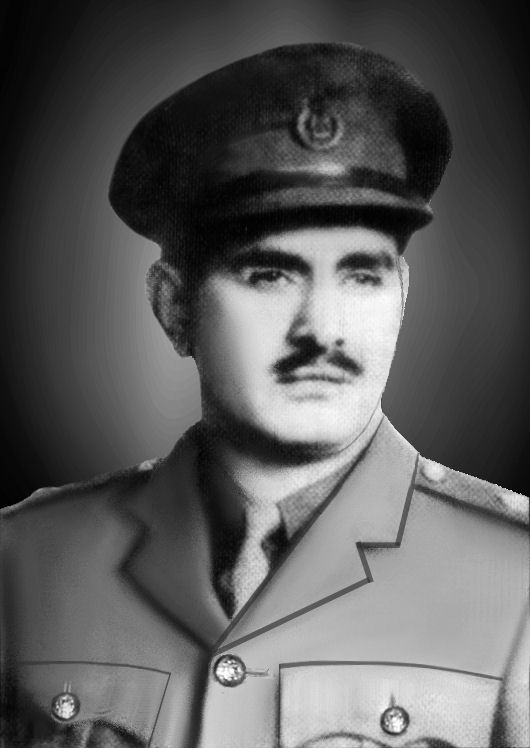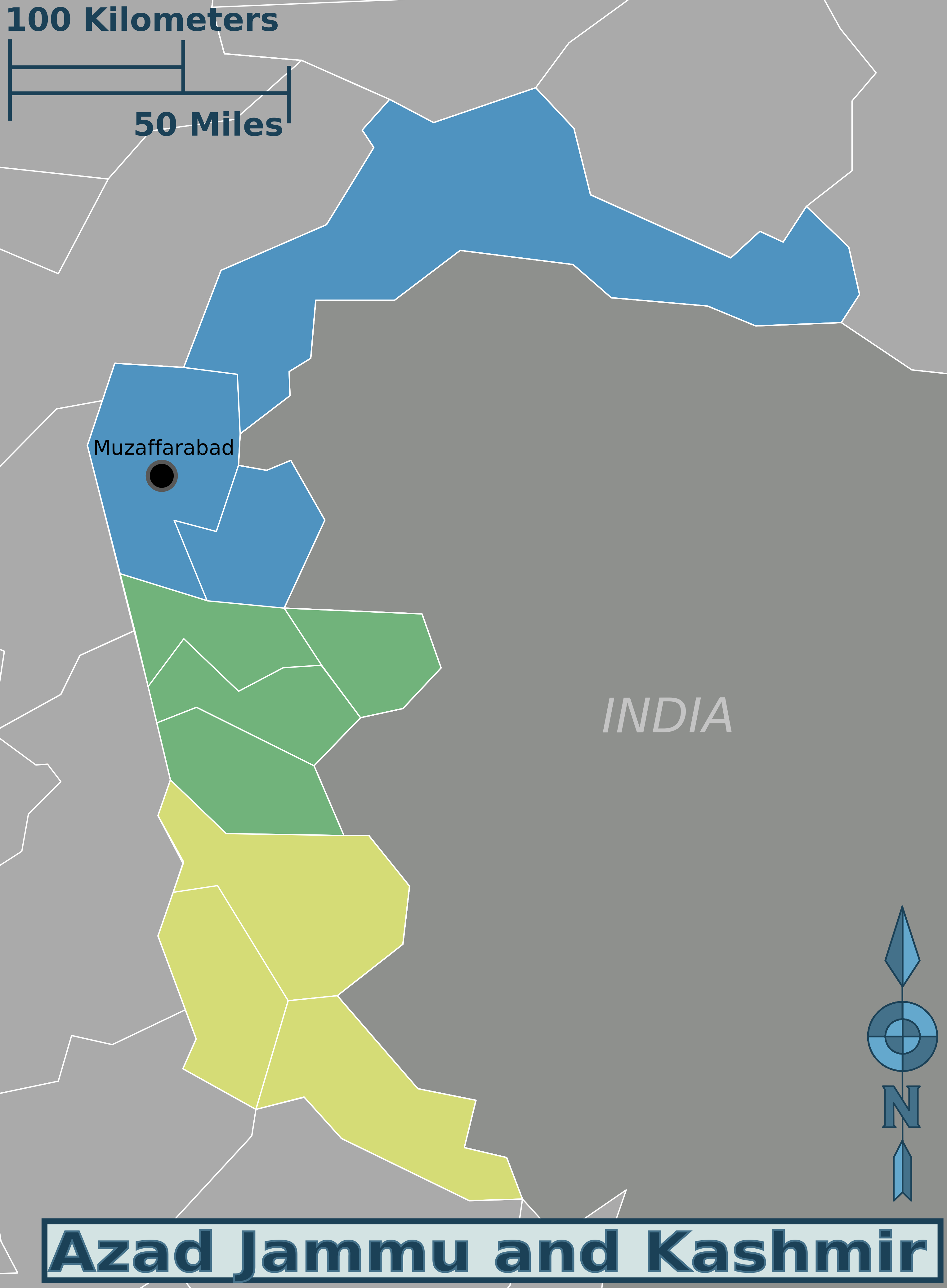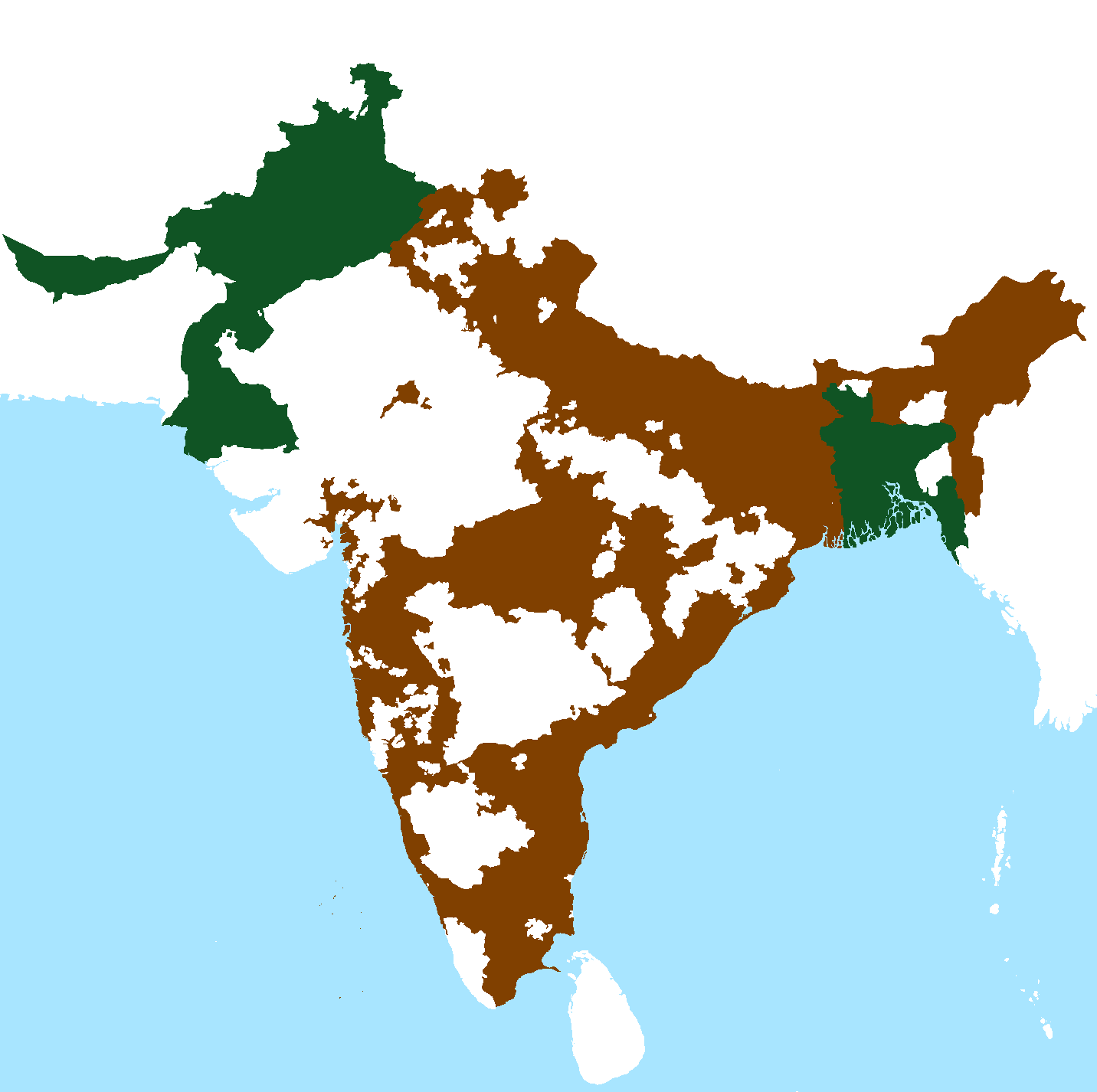|
Muhammad Ibrahim Khan (politician)
Sardar Muhammad Ibrahim Khan (22 April 1915 – 31 July 2003) was the key instigator of the 1947 Poonch Rebellion in the princely state of Jammu and Kashmir in British India and the later establishment of Azad Kashmir under Pakistani administrative control. He served as the first President of Azad Kashmir. His dismissal in 1950 led to the 1955 Poonch Uprising against Pakistan. He served as the president thrice afterwards, ending his last term in 2001. Early life and education Sardar Muhammad Ibrahim Khan was born on 22 April 1915 in Kot Mattay Khan, a village in the Poonch District of Kashmir to an elite Sudhan family. He received his primary education in his village. He attended college and received a Bachelors of Arts degree in 1937 at Islamia College (Lahore) and sought higher education abroad in 1938. He obtained his LLB degree from the University of London in 1941. Khan then obtained a law degree from Lincoln's Inn, and later started practicing law at Srinagar, Kashm ... [...More Info...] [...Related Items...] OR: [Wikipedia] [Google] [Baidu] |
President Of Azad Jammu And Kashmir
The Pakistan-administered state of Azad Kashmir was officially established on 24 October 1947. The president is the constitutional head while the prime minister is the chief executive of the state. The president elected by the Azad Jammu and Kashmir Legislative Assembly for term of 5 years under the provisions of Azad Jammu & Kashmir (Interim Constitution) Act, 1974. List of presidents The following individuals have served as president of Azad Kashmir. See also * Prime Minister of Azad Kashmir * Government of Azad Kashmir * List of Governors of Pakistan * List of Chief Ministers in Pakistan * List of Prime and Chief Ministers of Jammu and Kashmir The Chief Minister of Jammu and Kashmir was the title given to the head of government of Jammu and Kashmir. As per the Constitution of India, the Lieutenant Governor is the state's '' de jure'' head, but '' de facto'' executive authority rest ... Notes masood External links Website {{Azad Kashmir topics Politics of ... [...More Info...] [...Related Items...] OR: [Wikipedia] [Google] [Baidu] |
1955 Poonch Uprising
__NOTOC__ The 1955 Poonch revolt, also known as the 1955 Poonch uprising, was a Civil revolt in Azad Jammu and Kashmir against the State of Pakistan. The uprising broke out in February 1955 and was provoked largely by the dismissal of Sardar Ibrahim Khan. It took a year until the uprising was suppressed in October 1956. Events A major uprising occurred around the Rawalakot and Pallandri tehsils of Poonch (then a district, now a division), against the State of Pakistan amongst angry Sudhans. After the ‘bomb shell’ of Ibrahim's dismissal, ‘Colonel (Retired) Sher Ahmed Khan, a ''sardar'' and ''scion'' of the Sudhan tribe and the senior most military officer from Poonch, was made a cabinet minister with responsibility for defence, education and health. Colonel Sher Ahmed Khan resigned because his community, the Sudhans, were strongly opposed to his appointment in view of the dismissal of Sardar Ibrahim Khan; violent demonstrations had occurred particularly in the Rawa ... [...More Info...] [...Related Items...] OR: [Wikipedia] [Google] [Baidu] |
United Nations Commission For India And Pakistan
The United Nations Security Council Resolution 47, adopted on 21 April 1948, concerns the resolution of the Kashmir conflict. After hearing arguments from both India and Pakistan, the Council increased the size of the UN Commission created by the former Resolution 39 to five members, instructed the Commission to go to the subcontinent and help the governments of India and Pakistan restore peace and order to the region and prepare for a plebiscite to decide the fate of Kashmir. Secondly, the Resolution recommended a three-step process for the resolution of the dispute. In the first step, Pakistan was asked to withdraw all its nationals that entered Kashmir for the sake of fighting. In the second step, India was asked to progressively reduce its forces to the minimum level required for law and order. In the third step, India was asked to appoint a plebiscite administrator nominated by the United Nations who would conduct a free and impartial plebiscite. The resolution was adopte ... [...More Info...] [...Related Items...] OR: [Wikipedia] [Google] [Baidu] |
Murree
Murree (Punjabi, Urdu: مری) is a mountain resort city, located in the Galyat region of the Pir Panjal Range, within the Muree District of Punjab, Pakistan. It forms the outskirts of the Islamabad-Rawalpindi metropolitan area, and is about northeast of Islamabad. It has average altitude of . The British built this town during their rule to escape the scorching heat in the plains of Punjab during the summer. Construction of the town was started in 1851 on the hill of Murree as a sanatorium for British troops. The permanent town of Murree was constructed in 1853 and the church was consecrated shortly thereafter. One main road was established, commonly referred to even in modern times, as the mall. Murree was the summer headquarters of the colonial Punjab Government until 1876 when it was moved to Shimla. Murree became a popular tourist station for British citizens of the British Raj. Several prominent Britons were born here including Bruce Bairnsfather, Francis Younghusb ... [...More Info...] [...Related Items...] OR: [Wikipedia] [Google] [Baidu] |
Hari Singh
Maharaja Sir Hari Singh (September 1895 – 26 April 1961) was the last ruling Maharaja of the princely state of Jammu and Kashmir. Hari Singh was the son of Amar Singh and Bhotiali Chib. In 1923, following his uncle's death, Singh became the new Maharaja of Jammu and Kashmir. After Indian Independence in 1947, Singh wanted Jammu and Kashmir to remain as an independent kingdom. He was required to accede to the Dominion of India to get the support of Indian troops against an invasion by tribal armed men and the Pakistan Army into his state. Singh remained the titular Maharaja of the state until 1952, when the monarchy was abolished by the Indian government. After spending his final days in Bombay, he died on 26 April 1961. Singh was also a controversial figure due to his involvement in a blackmail scandal by a prostitute in Paris in 1921, the agitation in Kashmir against his government in 1931, and the rebellion against him in Poonch in 1947. Early life Hari Singh wa ... [...More Info...] [...Related Items...] OR: [Wikipedia] [Google] [Baidu] |
All-India Muslim League
The All-India Muslim League (AIML) was a political party established in Dhaka in 1906 when a group of prominent Muslim politicians met the Viceroy of British India, Lord Minto, with the goal of securing Muslim interests on the Indian subcontinent. The party arose out of the need for the political representation of Muslims in British India, especially during the Indian National Congress-sponsored massive Hindu opposition to the 1905 partition of Bengal. During the 1906 annual meeting of the All India Muslim Education Conference held in Israt Manzil Palace, Dhaka, the Nawab of Dhaka, Khwaja Salimullah, forwarded a proposal to create a political party which would protect the interests of Muslims in British India. Sir Mian Muhammad Shafi, a prominent Muslim leader from Lahore, suggested the political party be named the 'All-India Muslim League'. The motion was unanimously passed by the conference, leading to the official formation of the All-India Muslim League in Dhaka. It ... [...More Info...] [...Related Items...] OR: [Wikipedia] [Google] [Baidu] |
1947 Poonch Rebellion
In spring 1947, an uprising against the Maharaja Hari Singh of Jammu and Kashmir broke out in the Poonch jagir, an area bordering the Rawalpindi district of West Punjab and the Hazara district of the North-West Frontier Province in the future Pakistan. The leader of the rebellion, Sardar Muhammad Ibrahim Khan, escaped to Lahore by the end of August 1947 and persuaded the Pakistani authorities to back the rebellion. In addition to the backing, Prime Minister Liaquat Ali Khan authorised an invasion of the state, by the ex-Indian National Army personnel in the south and a force led by Major Khurshid Anwar in the north. These invasions eventually led to the First Kashmir War fought between India and Pakistan, and the formation of Pakistan administered Kashmir. The Poonch jagir has since been divided across Kashmir, administered by Pakistan and the state of Jammu and Kashmir, administered by India. Background Poonch was originally an internal ''jagir'' (autonomous principal ... [...More Info...] [...Related Items...] OR: [Wikipedia] [Google] [Baidu] |
Indian Independence Act 1947
The Indian Independence Act 1947 947 CHAPTER 30 10 and 11 Geo 6is an Act of the Parliament of the United Kingdom that partitioned British India into the two new independent dominions of India and Pakistan. The Act received Royal Assent on 18 July 1947 and thus modern-day India and Pakistan, comprising west (modern day Pakistan) and east (modern day Bangladesh) regions, came into being on 15 August. The legislature representatives of the Indian National Congress, the Muslim League, and the Sikh community came to an agreement with Lord Mountbatten on what has come to be known as the ''3 June Plan'' or ''Mountbatten Plan''. This plan was the last plan for independence. Prelude Attlee's announcement Clement Attlee, the Prime Minister of the United Kingdom, announced on 20 February 1947 that: #The British Government would grant full self-government to British India by 30 June 1948 at the latest, #The future of the Princely States would be decided after the date of final transf ... [...More Info...] [...Related Items...] OR: [Wikipedia] [Google] [Baidu] |
First Kashmir War
First or 1st is the ordinal form of the number one (#1). First or 1st may also refer to: *World record, specifically the first instance of a particular achievement Arts and media Music * 1$T, American rapper, singer-songwriter, DJ, and record producer Albums * ''1st'' (album), a 1983 album by Streets * ''1st'' (Rasmus EP), a 1995 EP by The Rasmus, frequently identified as a single * ''1ST'', a 2021 album by SixTones * ''First'' (Baroness EP), an EP by Baroness * ''First'' (Ferlyn G EP), an EP by Ferlyn G * ''First'' (David Gates album), an album by David Gates * ''First'' (O'Bryan album), an album by O'Bryan * ''First'' (Raymond Lam album), an album by Raymond Lam * ''First'', an album by Denise Ho Songs * "First" (Cold War Kids song), a song by Cold War Kids * "First" (Lindsay Lohan song), a song by Lindsay Lohan * "First", a song by Everglow from '' Last Melody'' * "First", a song by Lauren Daigle * "First", a song by Niki & Gabi * "First", a song by Jonas Bro ... [...More Info...] [...Related Items...] OR: [Wikipedia] [Google] [Baidu] |
Srinagar
Srinagar (English: , ) is the largest city and the summer capital of Jammu and Kashmir, India. It lies in the Kashmir Valley on the banks of the Jhelum River, a tributary of the Indus, and Dal and Anchar lakes. The city is known for its natural environment, gardens, waterfronts and houseboats. It is known for traditional Kashmiri handicrafts like the Kashmir shawl (made of pashmina and cashmere wool), and also dried fruits. It is the 31st-most populous city in India, the northernmost city in India to have over one million people, and the second-largest metropolitan area in the Himalayas (after Kathmandu, Nepal). Origin of name The earliest records, such as Kalhana's '' Rajatarangini'', mentions the Sanskrit name ''shri-nagara'' which have been interpreted distinctively by scholars in two ways: one being ''sūrya-nagar'', meaning "''City of the Surya''" (trans) ''"City of Sun''" and other being ''"The city of "Shri''" (श्री), the Hindu goddess of wealth, m ... [...More Info...] [...Related Items...] OR: [Wikipedia] [Google] [Baidu] |
Lincoln's Inn
The Honourable Society of Lincoln's Inn is one of the four Inns of Court in London to which barristers of England and Wales belong and where they are called to the Bar. (The other three are Middle Temple, Inner Temple and Gray's Inn.) Lincoln's Inn, along with the three other Inns of Court, is recognised as being one of the world's most prestigious professional bodies of judges and lawyers. Lincoln's Inn is situated in Holborn, in the London Borough of Camden, just on the border with the City of London and the City of Westminster, and across the road from London School of Economics and Political Science, Royal Courts of Justice and King's College London's Maughan Library. The nearest tube station is Holborn tube station or Chancery Lane. Lincoln's Inn is the largest Inn, covering . It is believed to be named after Henry de Lacy, 3rd Earl of Lincoln. History During the 12th and early 13th centuries, the law was taught in the City of London, primarily by the clergy. Then ... [...More Info...] [...Related Items...] OR: [Wikipedia] [Google] [Baidu] |
University Of London
The University of London (UoL; abbreviated as Lond or more rarely Londin in post-nominals) is a federal public research university located in London, England, United Kingdom. The university was established by royal charter in 1836 as a degree-awarding examination board for students holding certificates from University College London and King's College London and "other such other Institutions, corporate or unincorporated, as shall be established for the purpose of Education, whether within the Metropolis or elsewhere within our United Kingdom". This fact allows it to be one of three institutions to claim the title of the third-oldest university in England, and moved to a federal structure in 1900. It is now incorporated by its fourth (1863) royal charter and governed by the University of London Act 2018. It was the first university in the United Kingdom to introduce examinations for women in 1869 and, a decade later, the first to admit women to degrees. In 1913, it appoi ... [...More Info...] [...Related Items...] OR: [Wikipedia] [Google] [Baidu] |








